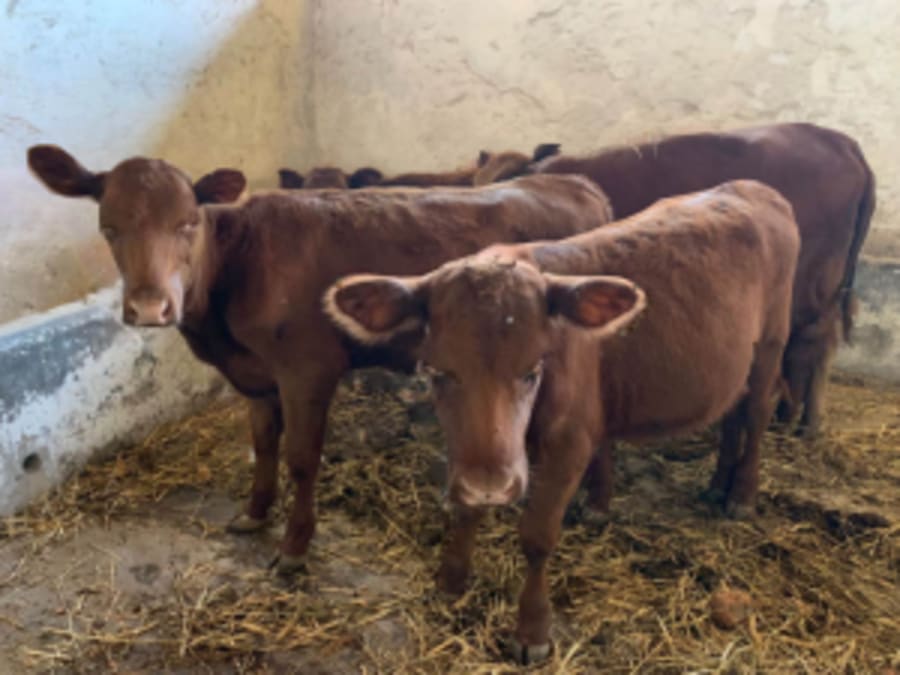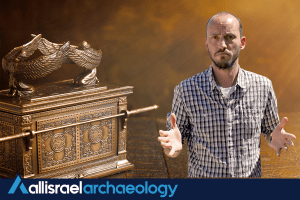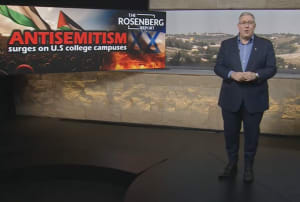Meet Robert Ilatov, the former Knesset member, who is building a global alliance of Jews and Christians through the Jerusalem Prayer Breakfast
The last prayer breakfast was watched by 1.5 million worldwide
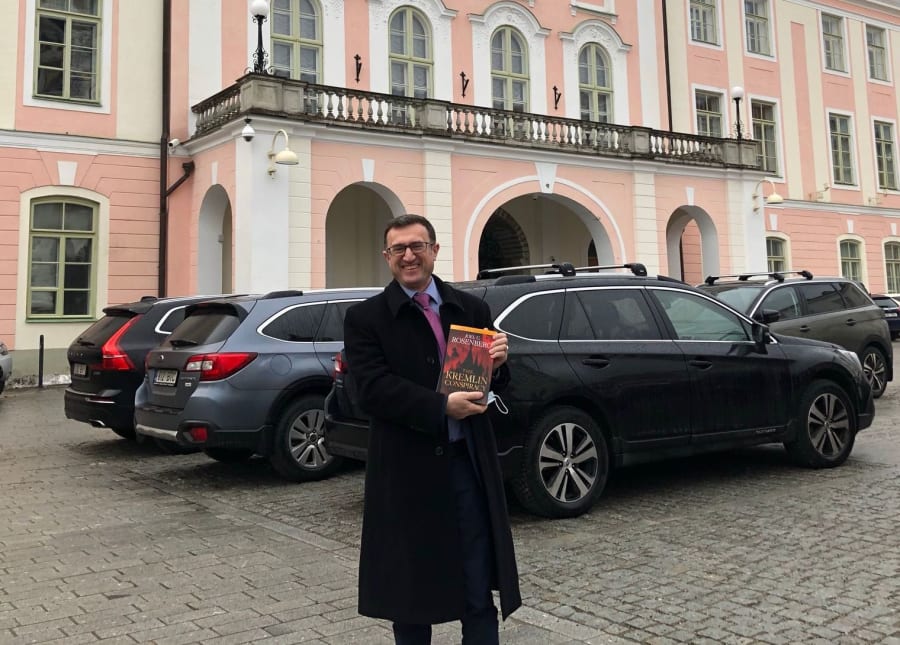
TALLINN, ESTONIA—What exactly is the point of the Jerusalem Prayer Breakfast movement?
Chairman Robert Ilatov put it best when he addressed Jewish and Christian leaders here in Estonia on Wednesday, along with leaders watching via livestream in 50 countries around the world.
When we talked about establishing the Jerusalem Prayer Breakfast, the most important idea was to bring the truth about Israel to the whole world.
Of course, in the Knesset we are so accustomed to fighting — you know: two Jews, but three different opinions and five different synagogues.
It was not easy to get the idea of the Jerusalem Prayer Breakfast approved through the whole Knesset, but I did succeed.
The idea is to bring about a dialogue.
It’s a difficult dialogue because we’re talking about a dialogue between people who have argued for 2,000 years over who is right and who is wrong.
But at the Jerusalem Prayer Breakfast everyone is welcome to pray.
ANCIENT TENSIONS, URGENT NEEDS
For more than 2,000 years deep and serious tensions have existed between Jews and Christians, both in Jerusalem and all over the world.
Since the rebirth of the State of Israel in 1948, however, hundreds of millions of Christians have fallen deeply in love with Israel and the Jewish people and sought to express that love in specific and practical ways.
Seeing the ancient prophecies about the coming rebirth of Israel and the regathering of the Jewish people to the Promised Land was profoundly moving and inspiring for them.
It also motivated them to dig into the Scriptures and rediscover what the Bible says about God’s deep love and plan for Israel, from Genesis through the Book of Revelation.
That said, few Israeli leaders have made it their personal mission to reach out to Christians and forge an alliance with them, or to take the risk of building bridges between Jews and Christians given the many historic and current sensitivities.
Prime Minister Menachem Begin was probably the first to actively welcome Christian leaders to visit the Holy Land, even occasionally speaking at their conferences.
Prime Minister Benjamin Netanyahu took this outreach effort to a whole new level, regarding the love that the world’s 600 million Evangelical Christians have for Israel as an opportunity to build not just a friendship but a strategic alliance.
Indeed, no Israeli has ever done more to meet with, speak to, befriend, listen to, promote tourism among, raise money from, and mobilize political support from Christians than Netanyahu, who has been so engaged for the past 30 years.
Still, with surging anti-Semitism around the world, the BDS movement and the growing Iranian threat, there is far more to do.
WHO IS ROBERT ILATOV?
Enter Robert Ilatov.
Born and raised a Jew in the Soviet republic of Uzbekistan in 1971.
He made aliyah to Israel in 1985 and served for a time as deputy mayor of Israel’s coastal city of Netanya.
Married with three children, he was elected to the Knesset as a member of Yisrael Beiteinu (Israel Our Home), the largely secular right-wing political party founded and led by current Finance Minister Avigdor Liberman.
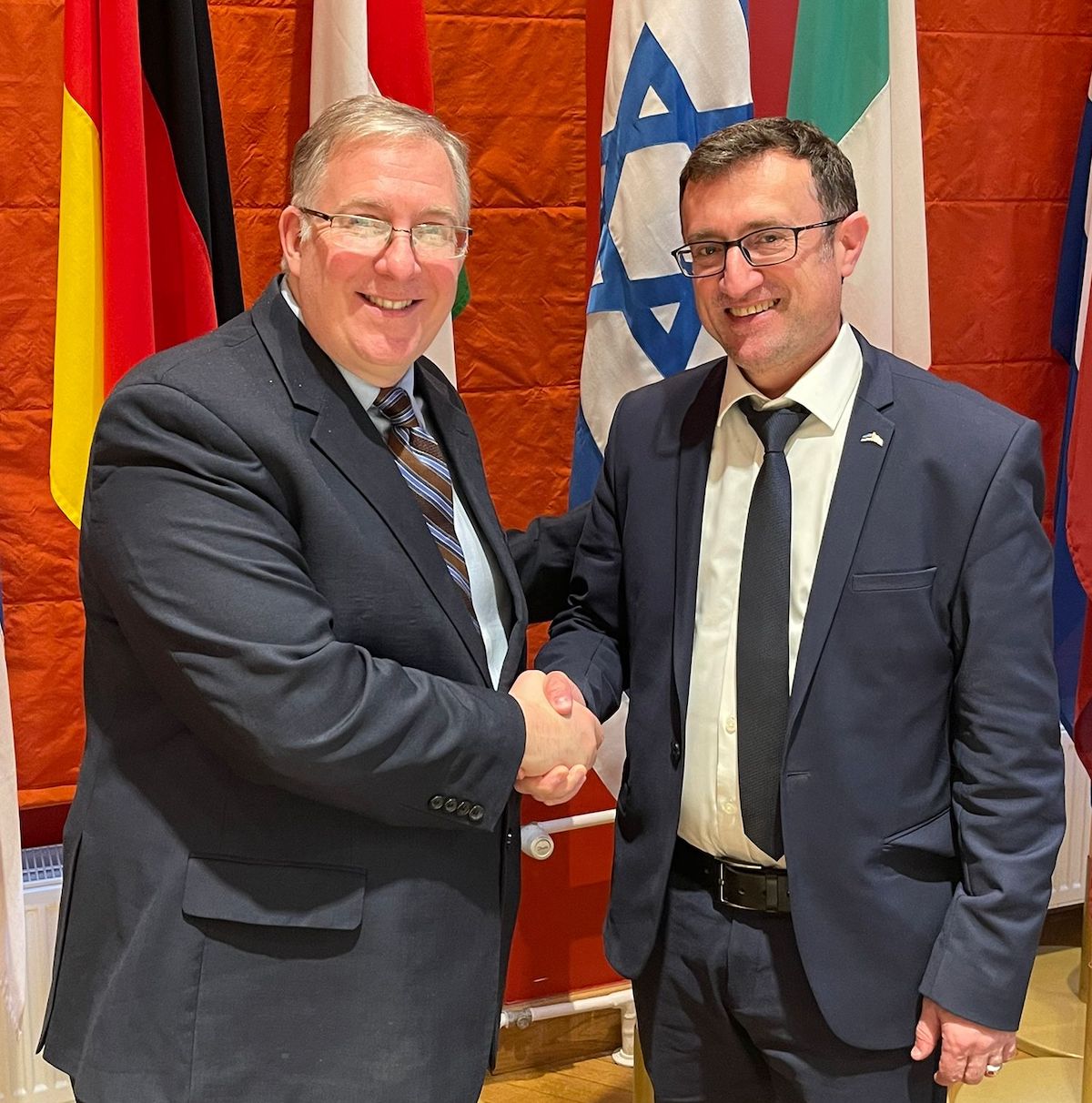
LEADING THE CHRISTIAN ALLIES CAUCUS
Soon, Ilatov was appointed head of the Knesset Christian Allies Caucus, which was in 2004 by the late MK Yuri Shtern, who was also a member of Yisrael Beiteinu.
The mission of the Caucus is “to build direct lines of communication, cooperation, and coordination, between the Knesset and Christian leaders around the world. We strive to establish relationships between the members of Knesset and leaders of Churches, Christian organizations, and political representatives worldwide,” as stated on its website.
During his tenure, Ilatov embraced the mission with vigor.
He helped forge and expand ties with Christian legislators in 42 parliaments around the world and helped the Caucus play a role in persuading the U.S. and Guatemalan governments to move their embassies from Tel Aviv to Jerusalem, backed by huge Christian support for such decisions in both countries.
“I really believe in bringing Jews and Christians together to advance common objectives,” he told me when we first met several years ago. “We don’t have to agree on everything. But we can agree on keeping Israel safe and free and strong. And that’s a great starting point.”
LAUNCHING THE JERUSALEM PRAYER BREAKFAST
In 2017, for the 50th anniversary of the reunification of Jerusalem, Ilatov launched an exciting new initiative with Albert Veksler, an Israeli who lives in Jerusalem with his wife and children, but was originally born and raised in the then-Soviet republic of Estonia.
Together, they organized the Jerusalem Prayer Breakfast which was attended by more than 500 Jewish and Christian leaders from all over the world to help accelerate and broaden a global movement of Jewish and Christian prayer for the peace of Jerusalem, according to David’s command to this end in Psalm 122:6.
It wasn’t easy to persuade members of the Knesset to back such a concept given historic tensions with the Christian community.
But somehow, Ilatov got it done.
“We are grateful that the Christian world leaders have assembled here in this great city,” Ilatov said at that inaugural event. “Your physical presence is symbolic of your spiritual strength and support. Thank you.”
Ilatov served as the chairman of the JPB, while Veksler served as the executive director.
They thought it was going to be a one-time event.
To their shock, attendees were so electrified by the event that they requested the prayer breakfast be held annually — and to hold similar events in their own countries.
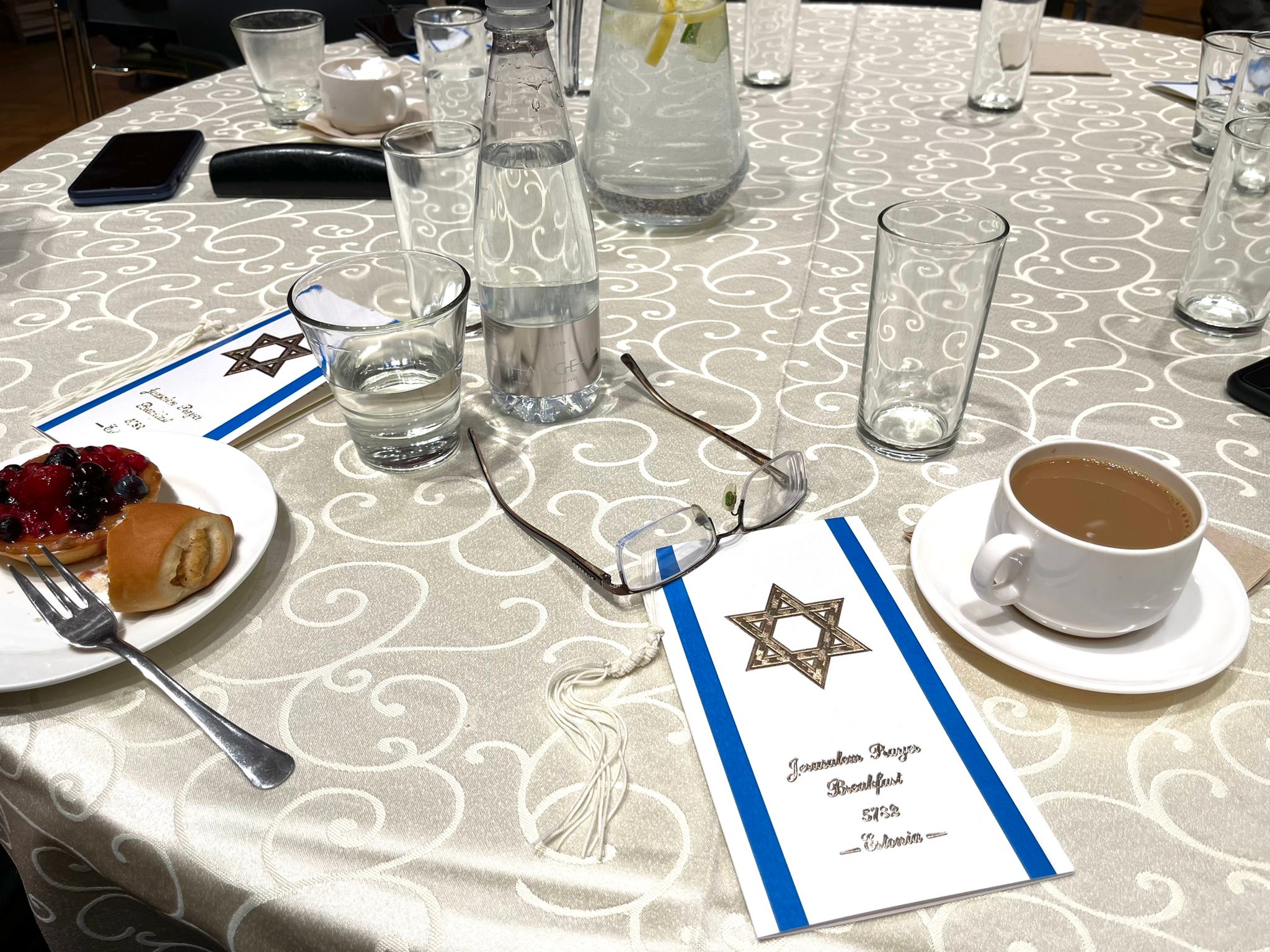
EXPANDING THE PRAYER BREAKFAST WORLDWIDE — AND STREAMING THEM LIVE
The two-day set of events and meetings here in Tallinn this week — including yesterday’s actual breakfast held inside the Estonian Parliament Building — represented the 14th Jerusalem Prayer Breakfast (JPB) to be held outside of the Israeli capital.
The event was webcast live and was watched by viewers in 50 countries.
In fact, streaming the event is a new innovation that Ilatov and Veksler only recently introduced.
The original breakfasts were in-person, invitation-only events.
But COVID has changed everything.
Last summer’s JPB in Jerusalem was only attended by about 100 people because of COVID restrictions.
But some 1.5 million watched online.
QUIET, CALM AND HIGHLY EFFECTIVE
What has so impressed me about Ilatov and Veksler is that they are not flashy, not pushy, and not interested in the spotlight.
They are quiet, calm and highly effective because both Jewish and Christian leaders in Israel and around the world see them as honest and trustworthy.
Last summer was only my first time attending, much less speaking at, a JPB.
But I was so encouraged by what I witnessed Ilatov and Veksler accomplishing that I immediately agreed when they asked me to be a keynote speaker here in Estonia, along with Rabbi (and former Knesset Member) Yehuda Glick.
Other speakers included:
Speaker of the Estonian Parliament MP Jüri Ratas, who previously served as prime minister
Israel’s ambassador to Estonia and Finland
the Chief Rabbi of Estonia
other Christian members of parliament
and a wide range of Jewish and Christian clergy and community leaders
Ilatov also addressed the event. His remarks are included below.
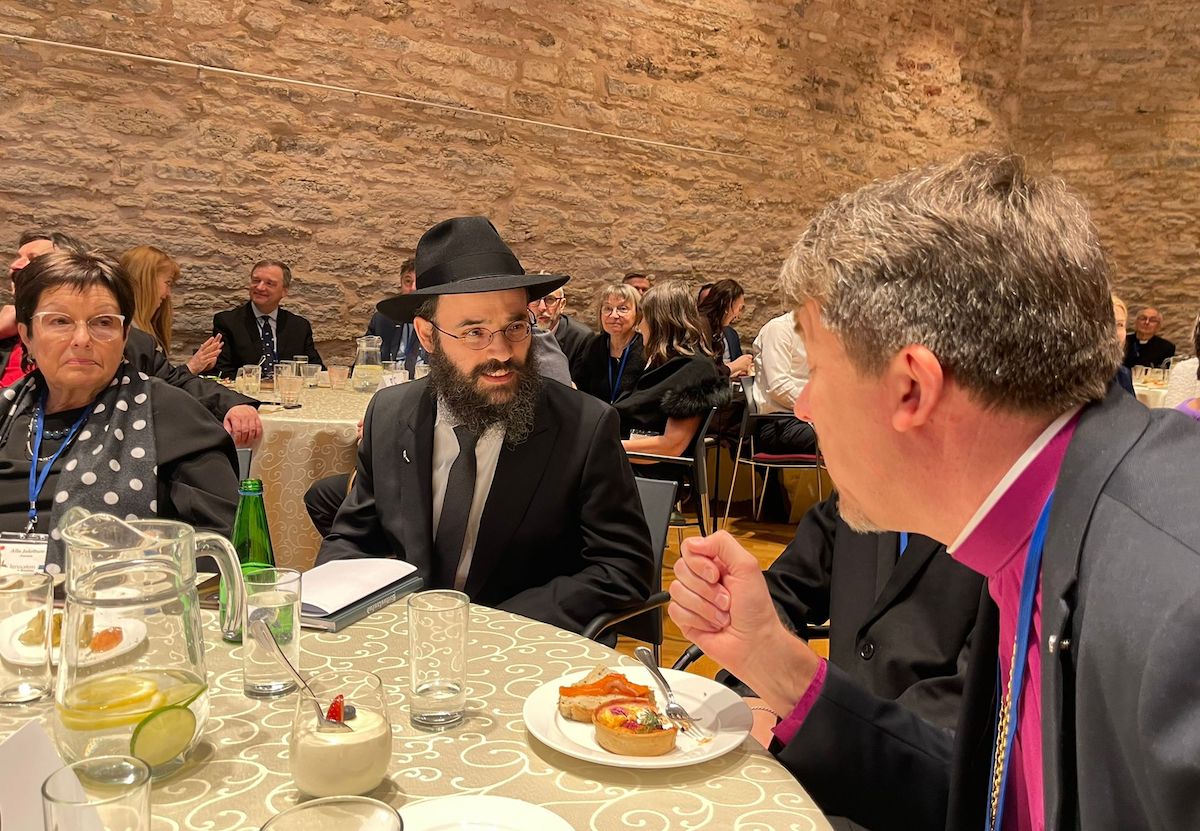
NEXT STOP: DALLAS, TEXAS
In March, Ilatov and Veksler will take the JPB to the United States for the first time.
The event will be held in Dallas and headlined by Senator Ted Cruz and Governor Greg Abbott.
And, of course, ALL ISRAEL NEWS, will cover the event for you because so few other media outlets do.
REMARKS BY JPB CHAIRMAN ROBERT ILATOV
These remarks are translated from Hebrew and lightly edited for clarity.
Today, I will keep my tradition and speak Hebrew.
It is my tradition to speak Hebrew at all the Jerusalem Prayer Breakfasts.
Our fathers spoke Hebrew — Abraham, Isaac and Jacob.
Until the Great Revolt of Bar Kochba, Jews spoke Hebrew.
The revolt that took place in year 135 — we don't hear much about it, but it is very symbolic for the Jewish people and all what transpired after that.
What the Jewish people are experiencing today, the very root of it is from the Bar Kochba Revolt.
What happened then?
Emperor Hadrian of Rome decided to rebuild Jerusalem and to rebuild the Temple.
But it was clear pretty soon that he doesn't want to restore the city as it used to be.
He didn't want to really build the Temple for the Jewish people as it was supposed to be. He wanted to build this as a Roman city.
There were discussions [among the Jewish people at the time] — some were for, some were against.
But there was one thing that broke the Jewish people's patience, and they went to war with the Roman Empire that had no hope of success.
And that was when the Romans made it forbidden for the Jews to circumcise their sons.
There were different streams within the Jewish community. There were people that were Hellenized [significantly assimilated into Greco-Roman culture and in some cases more secularized] and they had other kind of ideas [different from more traditional religious Jews]. But this thing united the Jewish people again.
What resulted was one of the fiercest battles in the history of the Jewish people. About one million Jews perished in this revolt.
And that moment started the expulsion of the Jews from Judea.
Then, in order to erase the name Jews and Jerusalem forever — because this was actually the battle between the belief in one God and the belief in idols — the Romans not only slaughtered one million Jews and destroyed Jerusalem, but they erased the name of Judea and replaced it with the name, “Palestine.”
The Romans expelled the Jews who survived and then forbade the practice of all Jewish traditions.
And from that moment they called the land “Palestine,” while the Jews in exiled insisted it was called, “Eretz Israel,” the Land of Israel.
So, when you say the word “Palestine,” this for the Jewish people represents the attempted destruction of the Jewish traditions of the faith in one God, the God of Israel.
Somebody just mentioned it in one of their speeches that the Jewish people came back to the land of “Palestine.” This is not accurate. We actually returned to Eretz Israel, the Land of Israel.
Then there are other people that say Jewish people are “immigrating” to Palestine.
No, no — we are ascending to the land of Israel.
Jewish people can immigrate to all kinds of countries, United States, wherever — but into Israel we ascend.
It is not just something symbolic. It has its foundation in the very Bible.
Yes, the Romans won the battle, but the war they lost.
The war over the faith in one God versus idols was won by the Jewish people who won without weapons, without a state, without leadership, only by faith.
There are many different kinds of Jews today. They can argue. They can speak different languages. But there is one language that is common to them. And there is nothing that would allow us to forget our very foundations.
Not the Romans.
Not the Spanish.
Not the Nazis.
Not the former Soviet Union.
We are small, but a very strong people.
When we talked about establishing the Jerusalem Prayer Breakfast, the most important idea was to bring the truth about Israel to the whole world.
Of course, in the Knesset we are so accustomed to fighting — you know: two Jews, but three different opinions, and five different synagogues.
It was not easy to get the idea of the Jerusalem Prayer Breakfast approved through the whole Knesset, but I did succeed.
The idea is to bring about a dialogue.
It’s a difficult dialogue because we’re talking about a dialogue between people who have argued for 2,000 years over who is right and who is wrong.
But at the Jerusalem Prayer Breakfast everyone is welcome to pray.
Like whichever idea is behind it, you will also hear the Jews and the Christians, you, the Muslims and Christians and the different Jews.
You all can sit in one place as friends.
Everyone is welcome to pray — Jews and Christians. And everyone can sit in one place as friends, and can bring one message: We love Jerusalem. It’s a holy city. And the wholeness and the peace of Jerusalem is actually the peace and wholeness of the whole world.
And I'm so thankful for everyone that has come — the honorable diplomats and the parliament members and all the founders and the organizers and the Jewish community and the Rabbi and the Christians. I'm so thankful for all of you. And it’s especially great to have Rabbi (and former Knesset Member) Yehuda Glick with us.

Joel C. Rosenberg is the editor-in-chief of ALL ISRAEL NEWS and ALL ARAB NEWS and the President and CEO of Near East Media. A New York Times best-selling author, Middle East analyst, and Evangelical leader, he lives in Jerusalem with his wife and sons.




